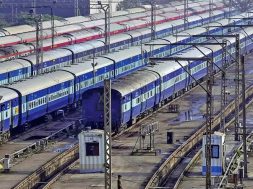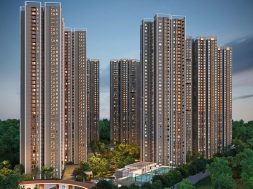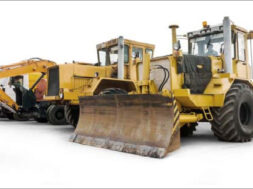Most bulk materials have been stored in open stockpiles which have lot of negative impacts on our environment. Today’s stringent environmental regulations being adopted by governing agencies across the globe prohibits such practices and increases demand for environment friendly aluminum domes. Nishant Jain, Director, Temcor Rollwell Domes Pvt. Ltd. describes.
The importance of open mineral storage piles in various power plants, port terminals have increased considerably in recent years in India to address the growing demand of raw material importation due to local mining operation closure. These storage piles are affected by the climatologically processes and the dust emission to the atmosphere, causing repercussions to health and environment.
Traditionally most bulk materials have been stored in open stockpiles. However, today’s environmentally conscious society considers most open air stockpiles unacceptable and, as a result, more stringent environmental regulations are being adopted by governing agencies in all parts of the world. The status quo is on the verge of changing. Airborne dust is not only a public relations problem; it is a housekeeping and a health & safety issue at the plant level. It is even a source of financial loss; it has been estimated that between 2-5% of stored product can be lost from open stockpiles due to wind erosion alone. The source of airborne fugitive emissions is generally as a result of activities such as loading, unloading, transfer, and storage, whereas groundwater contamination is attributed to open stockpiles.
Unfortunately, in India most of the coal is left in the open which is not environmentally clean and some environment agencies have taken a firm stand against the open stockpiling of bulk material because of the large volume of fugitive dust generated by the stockpiling operation. Additionally, ground winds blow and compound the problem as large quantities of airborne particulates will remain suspended. The airborne particulates are the primary pollution factor which is most highly objectionable for reasons of health and safety. As a result, standards have been established at various levels of the government designed to control this pollution source and inflict heavy financial penalties for violations.
Why cover?
If we assume that cost is the main deterrent for covering stockpiles, and we have difficulty in determining the cost of NOT covering, let’s take a look at this from yet another angle … a positive angle.
What would be the benefits, financial and other, of covering?
It is not unreasonable to say that covered stockpiles provide the following benefits:
• Airborne Pollution Control: Reduced dust emissions to prevent contamination of the atmosphere and surrounding areas.
• Ground Water Pollution Control: Eliminate contaminated rainwater runoff to reduce contamination of the food chain by not polluting potable water sources and the soil.
• Reduced Product Degradation: More consistent raw material quality results in improved product quality and stable process conditions.
• Improved Operational Efficiency from uniform product moisture: Better operational efficiency results in more ‘on target’ final product and less ‘off grade’ thus higher profits
• Cleaner Facility: Improved morale and workforce efficiency, as well as lower plant clean-up and grounds maintenance costs.
• Reduced Equipment Maintenance Costs: Dust particles can contaminate machinery such as bearings, air filters and various engine parts.
• Reduced Capital Investment: Dust can result in increased investment in new/replacement equipment
• Better Corporate Image: Less local opposition to operations and any expansion; become a better corporate citizen!
If we look at India specifically, the monsoon season plays havoc with open stockpiles; the losses of product and the impact on the environment (groundwater and/or surface water) can be substantial.
Since it seems that covering stockpiles apparently result is significant benefits to the operations, the environment, the workforce, product quality, costs, etc, we must again ask the question – “why are not more of bulk material stockpiles covered?”
Aluminium Domes – Ideal Storage Solution
Clear-span aluminium domes were first used over 40 years ago in industrial application, and eventually found themselves as the structure of choice for bulk material storage because of their advantages at large diameters. Temcor, a USA based company founded in 1964, continues to be a leader in the field and with over 8,500 installations in 75 countries, one will find these domes in nearly every conceivable application.
As with concrete domes, the circular footprint is the most efficient use of space and equipment, but the modular-type construction allows even greater design flexibility. It permits changes to the structure years after installation, for example, additional conveyor or mobile equipment openings can be installed with minimal structural impact. Aluminium domes typically are provided with skylights for daylight illumination which reduces the need for powered lighting. Perhaps the most important feature of aluminum domes is the range of size; they can be supplied up to 300m (1000 ft) in diameter, with no intermediate supports (i.e. clear-span). Aluminium dome economics are beneficial for various reasons:
• Reduced construction costs
• Reduced foundation costs because of lightweight of aluminium
• Aluminium domes are ideal for porous soil conditions
• Aluminium domes are less labour intensive and thus can be erected faster
• Aluminium with its natural corrosion resistance is ideal for marine environments, where salt laden air accelerate corrosion in conventional structures
• All materials of construction are high grade aluminium alloys (6061-T6 main structure, 3003-H6 for the panels, or skin, and occasionally a 5000-series alloys for other components)which will provide corrosion and maintenance free service for the life of installation
• The spontaneous ignition of coal stockpiles is a serious economic an safety problem and hence covering these stockpiles reduces the hazards of spot fires.
The emerging environmental regulations and major global companies desire to be a good corporate citizen, has created a new demand for stockpile covers. So, not only are stockpiles covered to protect the raw material for use in the plant, they are covered to protect the environment and those in surrounding areas.
With the rise in demand for covered stockpiles, the focus is more and more on aluminum domes.
Aluminium domes are lightweight reducing foundation requirements, easy and fast to erect reducingconstruction costs and time and will provide the longest service of any structure, all without any maintenance, lowering the lifecycle cost of the cover.
And let’s not forget, aluminium is a recyclable material, therefore the structure will have a residual value,even after plant’s closure that could be worth more at disposal than it did originally.
11
Cookie Consent
We use cookies to personalize your experience. By continuing to visit this website you agree to our Terms & Conditions, Privacy Policy and Cookie Policy.









